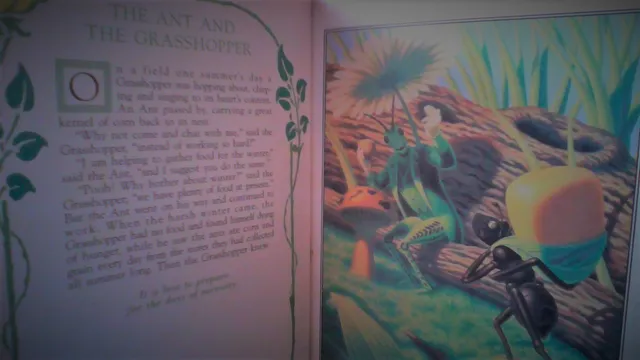You can check my comment on "The Hare and the Tortoise"
here.

“The Ant and the Grasshopper” is perhaps the most popular among Aesop’s fables. Famous British writer Somerset Maugham (1874-1965) wrote an eponymous short story which encloses a most peculiar version of this moralizing tale:
When I was a very small boy I was made to learn by heart certain of the fables of La Fontaine,
and the moral of each was carefully explained to me. Among those I learnt was The Ant and the
Grasshopper, which is devised to bring home to the young the useful lesson that in an imperfect
world industry is rewarded and giddiness punished. In this admirable fable (I apologise for telling
something which everyone is politely, but inexactly, supposed to know) the ant spends a
laborious summer gathering its winter store; while the grasshopper sits on a blade of grass
singing to the sun. Winter comes and the ant is comfortably provided for, but the grasshopper
has an empty larder: he goes to the ant and begs for a little food. Then the ant gives him her
classic answer:
"What were you doing in the summer time?"
"Saving your presence, I sang, I sang all day, all night."
"You sang. Why, then go and dance."
I do not ascribe it to perversity on my part, but rather to the inconsequence of childhood, which
is deficient in moral sense, that I could never quite reconcile myself to the lesson. My
sympathies were with the grasshopper and for some time I never saw an ant without putting my
foot on it.
In Maugham’s narrative, the Ant and the Grasshopper are brothers George and Tom Ramsey. But this time, as you may anticipate, it is the Grasshopper who laughs last. I have met a lot of readers who would also consider this a more reasonable denouement, as they think the Ant’s attitude ill-natured. I won’t include myself in this group.
Here’s the moral of the original fable taken from the Unicorn Publishing House Easop’s Fables (1988):
It is best to prepare for the days of necessity.
Consider it a pedagogical flaw
Children are supposed to learn from the Grasshopper’s experience and fear giving in to their own lightheadedness. And here’s the problem: young readers are tacitly asked to play the Grasshopper, and so they identify themselves with it, instead of empathizing with the Ant. Consider it a pedagogical flaw.
The fabulist is certainly not a teacher; however, a moralizing tale is obviously intended to teach a moral lesson. The goal is not plain entertainment. The young reader is expected to learn from the Ant, but the truth is they can hardly put themselves in the Ant’s position; instead, they can’t probably help feeling sorry for the Grasshopper and feeling like grasshoppers themselves.

Illustration by Milo Winter - Image in the Public Domain

Thanks for reading about Children’s Literature.

Posted from my blog with SteemPress : https://marlyncabrerawp.000webhostapp.com/2019/05/what-a-fable-may-teach-a-child-the-ant-and-the-grasshopper

Soy miembro de Talent Club.
